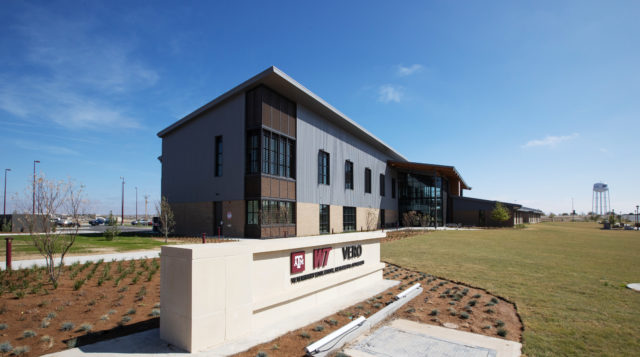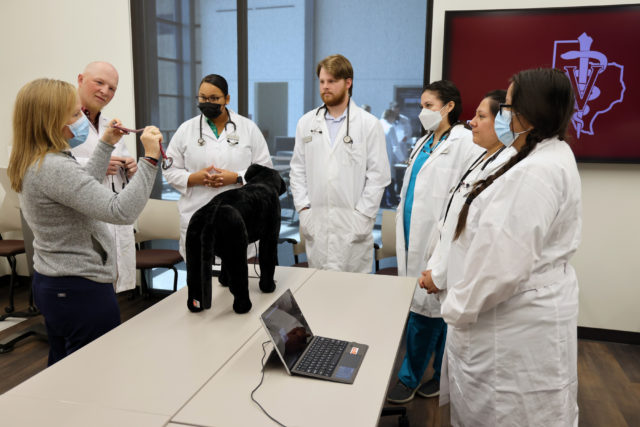Veterinary Education, Research, & Outreach (VERO)

The Veterinary Education, Research, & Outreach (VERO) program—a partnership between the Texas A&M College of Veterinary Medicine & Biomedical Sciences (VMBS) and the West Texas A&M University (WT) Paul Engler College of Agriculture & Natural Sciences—was created to increase the number of graduates pursuing large animal and mixed animal medicine and to support Texas’ thriving livestock and food animal industries as well as rural communities in need of veterinary practitioners. VERO also collaborates with the Texas A&M Veterinary Medical Diagnostic Laboratory (TVMDL) in teaching, service, research, and faculty hiring. The world-class VERO facility opened in 2021 and is located in Canyon, Texas—the heart of the Texas Panhandle.
Exemplary Education
The 2+2 Doctor of Veterinary Medicine (DVM) program at VERO allows students to spend the first two years of their veterinary education at VERO before heading to College Station for their third and fourth/clinical years. This unique program boasts small class sizes and is the only 2+2 program that resides in the same state as its “home” veterinary school.
Classes are taught by a team of 15 veterinary clinical educators who ensure 2+2 students receive the same nationally ranked veterinary medicine education as the students who start in College Station.
Each year, the VMBS DVM program will accept up to 18 students for its 2+2 program. The school welcomed its first 2+2 class at the VERO facility in the Fall 2021 semester.
Among the advantages VERO offers for all Texas A&M DVM students are:
- Fourth-year clinical rotations in feedlots, dairies, and cow/calf and other livestock operations in the Texas Panhandle.
- The six-day Food Animal Production & Rural Practice Tour and the six-week Food Animal & Rural Practice Summer Internship Program help first- and second-year veterinary students learn more about careers in Texas Panhandle- based industries and rural veterinary clinics.

Impactful Research
Faculty and graduate students at VERO are pursuing collaborative research that advances animal, human, and environmental health and addresses the sustainability of animal agriculture and rural communities. VERO researchers work on issues of great local importance while striving to make a global impact. The team has received $3.5M in new funding from federal and industry sponsors over the past three years.
- VERO partners with researchers and graduate students at WT, TVMDL, and AgriLife to translate research discoveries into useful information that benefits the people and agricultural economies of Texas, the U.S., and the world.
- Research areas within livestock agriculture include bovine respiratory disease, antimicrobial use and resistance, food safety, liver abscesses, cattle behavior, and animal welfare.
- A fundamental part of the VERO research initiative is to recruit and train highly qualified, highly motivated students in the skills needed to serve the future of agricultural industries and veterinary medicine worldwide.
Unparalleled Outreach
At the heart of VERO is a robust outreach mission, which includes programs for secondary and undergraduate students as well as livestock workers. Working with WT faculty, VERO has developed a seamless, overarching educational program to serve the region’s rural community, their children, and their employees.
Among these programs are those that:
- Contribute to the livestock and veterinary career education of 4-H and FFA students, as well as their leaders, and teachers.
- Provide mentorship to pre-veterinary students at WT and other regional colleges and universities.
- Offer training and veterinary continuing education in production management, livestock well-being, and safety.
Please Contact Us for More Information
Veterinary Education, Research, & Outreach (VERO)
Texas A&M College of Veterinary Medicine & Biomedical Sciences (VMBS)
& West Texas A&M University (WT) Paul Engler College of Agriculture & Natural Sciences
VERO Building, WTAMU Campus | 3201 Russell Long Blvd. | Canyon, TX 79015
Tel: 806.651.7300 | Web: vetmed.tamu.edu/vero
Last Updated: Fall 2021
